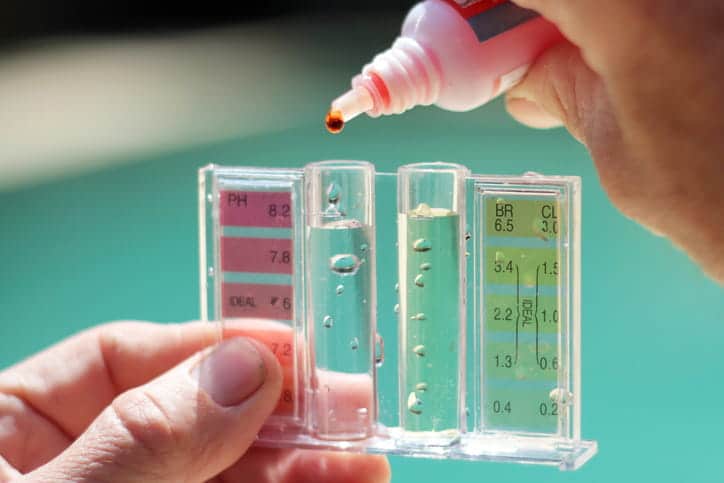
Have you ever experienced discolored water, an unpleasant odor, or an odd taste from your tap? These issues raise immediate concerns, but the underlying factors affecting water quality are complex and widespread.
In this article, you’ll learn about the factors that influence the safety and purity of your water supply to keep you and your home safe.
Top Factors That Impact Water Quality
Understanding the top factors that impact Las Vegas water quality can help protect your health and the environment. By identifying these factors, you can take proactive steps to get clean and safe water for you and your family.
Here are the most common reasons you may have bad water quality in Las Vegas and how to start making changes.
Sedimentation
One of the few natural reasons you may have bad-quality water is sediments traveling from the organic materials outside your home into pipes via erosion or runoff from rain.
Heavy waters can force a significant amount of particles into other areas, causing your water supply to look cloudy or have an off-taste.
To fix the issue, you can install filters in your water lines to help strain bigger sediment particles. You’ll want a reliable plumber from Larkin Plumbing to install the system correctly so you don’t have any future leaks or other issues.
Old Plumbing
Over time, the original pipes in your home corrode, leading to rust and contaminants seeping into your water supply. The lead inside your old plumbing system may leak into your water supply, causing significant risks to your health.
Repiping or replacing old plumbing systems will prevent lead from seeping into your water and avoid any metallic taste. The job requires considerable plumbing knowledge and experience. Unless you’ve handled a project of this size before, it’s best to call in a professional for help.
Call Larkin Plumbing for help with your plumbing needs.
Pollutants
A large amount of pollutant runoff from industrial, agricultural, and commercial sources can contaminate your water supply. Some of the most common pollutants include:
- Pesticides
- Fertilizers
- Chemicals used in manufacturing processes
- Fuels
- Sewage
These contaminants pose health risks and can alter the taste and safety of your drinking water. You can install home filtration systems to eliminate the water contaminants, but you’ll want a service to come out and do the heavy lifting.
You can also take care of ongoing maintenance once everything is set up.
Community Usage
As more people tap into the same water source, local reservoirs and water treatment plants struggle to meet the demand. The extra strain can cause filters and systems to not work properly, allowing more water contaminants and other pollutants to enter the water. Unless you’re on a well-water system, you need regular testing and maintenance to identify when you have bad water.
Water Heater
Unless a water heater is drained regularly, stagnant water can collect sediments that will make their way into your water supply. When too many unwanted particles are inside the water, you’ll start noticing discolored water with an unpleasant taste.
To remedy the problem, start draining your water heater about once a year by attaching a hose to the drain valve and flushing out any sediment. If the process is too overwhelming, hiring a professional service like Larkin Plumbing can save you time and prevent any potential accidents.
Maintenance Schedule
To maintain high water quality, you should set up a consistent maintenance schedule to prevent long-term issues.
Here are a few common tasks you can set up throughout the year:
- Inspect and replace water filters
- Periodically test your water quality
- Clean aerators on faucets regularly
- Schedule an annual professional inspection
Larkin Plumbing can help with our professional maintenance services to keep your systems functioning correctly by checking for potential issues before they become problems.
Call Larkin Plumbing for help with your plumbing needs.
Common Signs of Poor Water Quality
Identifying poor water quality early can help prevent health issues and structural damage to your home. Here are three major signs that will let you know you might have water quality problems:
- Discolored water: If your tap water appears brown, orange, or cloudy, it signifies the presence of rust, sediment, or other contaminants
- Foul odor: A strong smell of chlorine, sulfur (reminiscent of rotten eggs), or any unusual odor can mean there are harmful chemicals or bacterial contamination
- Unpleasant taste: Bitter, metallic, or otherwise off-tasting water typically suggests the presence of minerals, chemical agents, or pollutants in your water supply
Partnering With a Water Quality Specialist
Plumbing specialists like Larkin Plumbing have the knowledge and tools to diagnose problems quickly instead of wasting valuable time on trial and error. We have been testing and improving water quality in Las Vegas and surrounding areas like Henderson and Summerlin since 1936.
Let us safeguard your home and help protect you and your family from unwanted contaminants that pose risks to your health. Don’t leave your water quality to chance; trust a professional like Larkin Plumbing to deliver clean, safe water to your home.
FAQ
What Has the Biggest Impact on Water Quality?
External pollutants and outdated plumbing systems have the largest impact on home water quality because they contain contaminants that pose a safety risk.
How Important Is Water Quality?
Water quality greatly impacts the health and well-being of everyone in your household. Poor water quality can lead to serious health risks such as gastrointestinal illnesses, reproductive problems, and neurological disorders.
How Can I Test the Quality of My Water at Home?
You can easily test the quality of your water at home by using an over-the-counter water test kit. These kits often come with strips that change color based on the presence of different contaminants.

